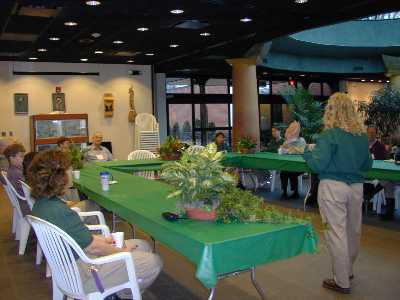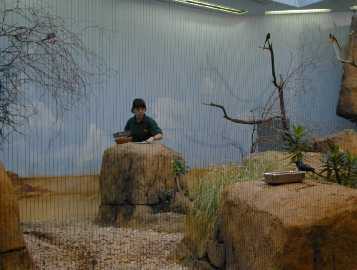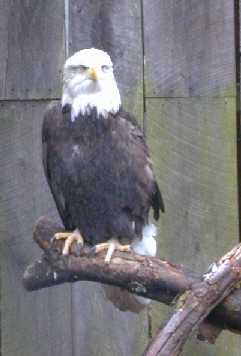 The aviary is open from 9am to 5pm every day of the year except Christmas. Admission is free to members, $5 for non-member adults, $4 for Seniors, and $3.50 for children 2 - 12. There is free parking in their lot next to the aviary.
|
 The guests were assembled, enjoying a light breakfast. I handed out the name tags, and we made our introductions. I looked up to see Larry at the pay phone, calling AAA. The car was truly dead.
The guests were assembled, enjoying a light breakfast. I handed out the name tags, and we made our introductions. I looked up to see Larry at the pay phone, calling AAA. The car was truly dead.
While we ate, several bird handlers walked around the table, birds on their arms. These birds have "graduated" to the education program, because they are comfortable with humans, and will step onto offered arms at command. |
Then we moved into the kitchen area where two staff members explained the diet given to the various birds and showed us sample food bowls. The diets are carefully balanced to the needs of the birds. Some birds are damaged by high iron, and are given special diets. Some birds get their red coloration from their diet - in the wild through berries or, in the case of flamingos, shrimp. In captivity, dyes must be added to the food. Seed eaters were also given vegetables and fruit, to round out their diet. The only "live" food offered are worms and crickets. Raptors get frozen mice and rats, which come to the aviary in 50 lb bags. Meatballs made of horsemeat are also given. Frozen smelts and minnows are given to sea birds.  Feeding times are 6 am and around 1:30 pm. Most of the birds had already been fed, but several caged groups went hungry so that we could watch them being fed. We watched the trainer hold out minnows for the terns in the wetlands room, reminiscent of feeding the gulls on a Florida beach!
In the desert room the thick knee rapped his grub smartly against the rock before eating. In one cage there was a wee hummingbird, visiting his nectar feeder - and joined by several other unrelated nectar lovers.
Feeding times are 6 am and around 1:30 pm. Most of the birds had already been fed, but several caged groups went hungry so that we could watch them being fed. We watched the trainer hold out minnows for the terns in the wetlands room, reminiscent of feeding the gulls on a Florida beach!
In the desert room the thick knee rapped his grub smartly against the rock before eating. In one cage there was a wee hummingbird, visiting his nectar feeder - and joined by several other unrelated nectar lovers. |
We talked with an educational docent, who told us more about their educational program. They have programs which go to the schools; there are a number of birds that are tame enough for this job. Other school children are brought to the aviary on field trips: there are 2 nicely appointed classrooms there.
 The docent stressed the need to teach children to respect birds, and all living things. They do this by example: There is a female eagle there, who had been shot in the wild in Alaska. Her wing had to be amputated. She is an example of the damage a careless shooter can do. She will live out her life in the aviary. The docent stressed the need to teach children to respect birds, and all living things. They do this by example: There is a female eagle there, who had been shot in the wild in Alaska. Her wing had to be amputated. She is an example of the damage a careless shooter can do. She will live out her life in the aviary. They also keep crow in one of the aviary cages, caught as a baby and kept as a pet until the owner found keeping it too difficult. Another lesson on display. Our Aviary is the best in the nation, and for this reason has been desigated The National Aviary. Half of their birds are not on display, but are part of a breeding and rehabilitation program. Those that can be, are released into reserves throughout the world.
As we finished our tour, I collected the name tags and handed out evaluation forms, and suddenly Larry reappeared! The saga of the car was not over! AAA had started the car, and left, but before Larry had even left the parking lot, the car conked out again. He had to call them back. Now, the car was attached to the tow truck and they were ready to leave for the south hills. Did I still want to walk to town, or would I prefer to ride in the tow truck with him? And I thought, as we left the lot, that the flapping I might have heard when I arrived was not the wings of one of the outside birds, but of my guardian angel. Another person might complain and grumble about the breakdown, but I thought, what if the car had conked out in the Liberty Tunnel, or on the 9th St. Bridge? Or anywhere else along the way? My guardian angel held back the breakdown until I reached my destination, and I thank her for it.
|